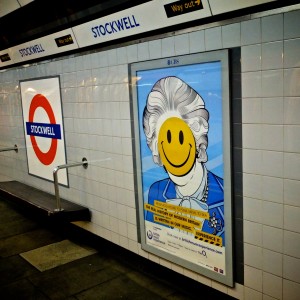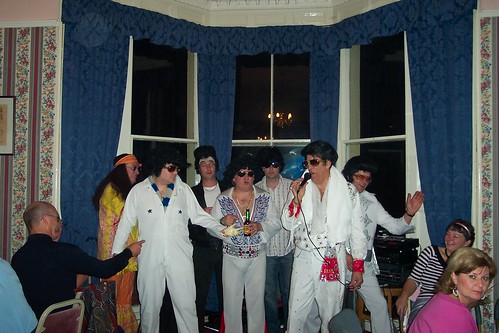Have you ever been consulted? How did it feel?
I’ll wager it felt a lot less like being asked to help direct a process and a lot more like a cowboy exhorting you to leap onto a runaway steam train, unhook the carriages, and save the women and children. The brakes aren’t working, the lever on the points has snapped, there’s a tunnel coming up and you’re on the roof.
Now imagine that train isn’t uncontrolled, there are drivers and they’re intent on stoking the boiler. And that train has over a million passengers.
That’s how I felt about a huge consultation exercise announced by Birmingham City Council in late 2008: The Big City Plan, the council told us, was to be about “the next twenty years” of the City Centre and by extension have a huge impact on the rest of the city. “Get this right or face years of problems” it seemed to say. So I wanted to help, I wanted to spread the word, to make sure that as many people as possible would contribute. I wanted to have a real conversation with people who understood the issues and chip in where I could be helpful. I’d been running a fairly well known blog about the city (Birmingham: It’s Not Shit) for eight years or so, I knew there was a knowledgable audience out there that would engage if they found it easy enough.
And then I saw the consultation documents. A glossy leaflet what seemed to say as little as it could, and a monolithic downloadable ‘Work in Progress’ PDF that talked of “sustainable delivery vehicles”. I liked the idea of a city buzzing with shop-bikes, rickshaws and sack trucks instead of lorries, but I wasn’t quite sure what was being proposed. I needed help before even starting to read it.
Birmingham had a very well connected online scene by that point: it still does, but it was fairly unusual as far as towns and cities went that that point. Bloggers, web people, early adopters, had started to meet offline and form the real-world connections that helped things to happen. The social glue of the nonsense talked online, the quick, friendly and fun interactions had really created bonds. We’d played hashtag games on Twitter before anyone had thought of hashtags secure in the knowledge that our networks understood what we were doing, we’d drunk coffee and beer together, we’d even performed an online pantomime. So at the next Social Media Cafe, a coffee morning for webbies organised by Joanna Geary, a few of us sat around a table and asked “is there anything we can do?”
A consensus emerged that there were two issues with the consultation that we could help with. One was that the online space didn’t have open comments on it (they were accepted but not published, so there was no space for conversation)—a forum or a blog with comments on it would be easy, we’d just need to make sure the huge amount of words and questions were divided up properly. There were plenty of people who could set up and host a site, I volunteered and had a basic place up and running pretty much by the end of the meeting. I used WordPress, a blog platform that says it has a “famous five-minute install”. In reality it can take less than that, bigcitytalk.org.uk was live for use very quickly.
The other just looked much more difficult, it was going to be impossible to have conversations if people couldn’t understand the questions.
It wasn’t just the jargon ‘regen-speak’ as one of us called it, there were references to further ‘spacial plans’ and bodies that just wouldn’t mean anything to the uninitiated. Essentially, we agreed. The whole thing needed ‘translating’ before any conversations could begin. Did we have the skills, time and motivation to do that?
Consultations officially last eight weeks, and by the time we saw how this Big Plan was shaping up one had already gone. To add to that the council had scheduled this one over Christmas. We might have more free time, but getting people to forgo enough of that might not have been easy. The problem is a lot of larger scale volunteer effort is that you need to believe that others are as committed as you—if I spent two weeks translating but not enough other people do to finish we don’t succeed. You can’t build half a boat.
But those, supposedly weak, online ties were enough to trust that the volunteers would see the job through. Those inconsequential interactions to have consequences. They build relationships. It wasn’t inconsequential to my mind that the majority of the volunteers had appeared in the Twitpanto we’d held the previous year. Nick Booth, Nicky Getgood, Julia Gilbert and Michael Grimes made up the team.
Over the first week or so of the new year the small team of five translators spent a good few hours every evening translating, but it wasn’t just a case of using Plain English. There was great discussion over the web about what certain passages actually meant. We used our contacts inside the council and with other experiences to try to get past the words to the actual meanings, to be able to link to supporting sites and explain how some of the ideas linked up. It had us tearing at our hair, Michael and Nicky spent at least a day fretting about the meaning of one paragraph, the collected wisdom prevailing that it didn’t really mean anything. We had to be very careful not to be seen to be influencing content, and to make sure that any comments we did get would be counted as official.
There were comments aplenty, we counted nearly 300 by the close of the consultation period. They were constructive, conversational and intelligent. And while a few hundred might not sound a lot the whole consultation got around 1,500, it was backed with billboards, bus adverts and all sorts of publicity.
But if the wisdom of the crowd was to help direct that train those comments had to be fed into the official process. That proved more difficult than it needed to, the council staff weren’t ready to deal with the volume or the idea that people would spend so much time and effort doing what our team had done.
We could have been confrontational at this point, but while there might be the temptation to shout being nice always seems to have the better effect with large organisations. We were relentlessly positive and helpful, we offered every format imaginable and eventually submitted the comments by post and email making sure that they couldn’t be ignored.
Did we stop the train? I’m not sure, but a small group of constructive activists couldn’t have done more to make sure that a supposedly huge consultation reached as many people as possible. If Birmingham gets to the right place in twenty years then it owes some to it’s engaged online community.
This was originally written for The Community Lovers Guide To Birmingham.




